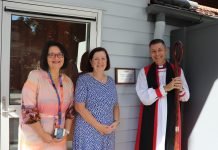A GP who has helped to develop online training courses for aged care staff says exercise programs should be in place for all aged care clients.
Dr Vu Tran says that too often exercise programs are initiated after a major medical event requiring some form of reconditioning, however the same exercises prescribed after an event would likely have helped to prevent it in the first place.
“When we consider the importance of exercise and physical fitness in later life, it’s important to acknowledge the role lack of physical activity plays in physical decline,” Dr Tran said.
“Benefits of exercise in the elderly are well researched and proven ranging from reducing risk or impact of cardiovascular and respiratory disease through to improving muscle mass and bone density and subsequently reducing the risk of falls as well as the overall reduction in mortality and morbidity.
“As carers and clinicians charged with improving the quality of life of the elderly, accepting therefore that older people are frail and weak and that the risks associated with exercise could be hazardous to their health can have a drastic negative impact on a client’s or resident’s health and overall quality of life.
“Exercise programs should be designed based on a resident’s or client’s level of capacity and capability. For some exercise programs for those with very little capacity could be as simple as breathing exercises and joint mobility exercises or even a simple six-minute walk test through more extensive programs such as dedicated exercise classes run by exercise physiologists, hydrotherapy and group fitness activities such as yoga and pilates.
Dr Tran says although some providers make extensive exercise programs available to their residents and clients, in many circumstances access to resources can be a key challenge, which could be overcome by simple upskilling.
“We have seen increasing demand from aged care and community care providers seeking staff training around topics including falls prevention, managing dementia and more recently provisioning safe exercise programs for the elderly,” Dr Tran said.
“Though falls prevention and dementia management are common staff training topics in aged care, the emergence of demand for training around safe exercise practices is a positive sign.”
“Professional development opportunities around learning to provision or safely executing exercise programs prescribed by exercise physiologists or safely assisting and encouraging residents in undertaking exercise can be an excellent skill to have. This skillset will not only result in better client outcomes but also provides the aged care worker with a valuable skill to enhance capabilities in their workplace.
“As a GP, I always consider the cliché that prevention is better than cure as incredibly relevant. We often find ourselves hesitating on the off chance an accident occurs but neglect that there is an almost guarantee that inaction will result in an adverse outcome for those we are caring for.
The risk posed to those we care for as a result of our own inactivity on this topic is therefore possibly greater than any risk associated with facilitating and encouraging physical activity in those we care for.”










